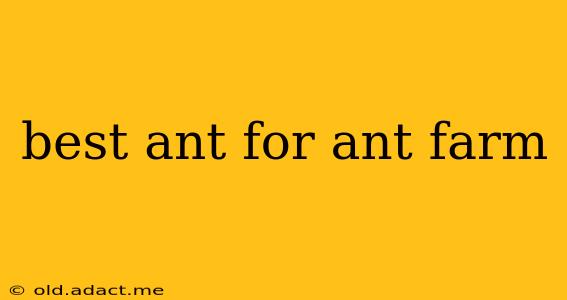Choosing the right ants for your ant farm is crucial for a thriving and engaging colony. Not all ants are created equal, and some species are far better suited to the confines of an ant farm than others. This guide will help you select the perfect ant species for your needs, considering factors like size, activity level, and ease of care.
What Makes an Ant Species Ideal for an Ant Farm?
Several key characteristics make certain ant species excellent choices for ant farms:
- Size: Medium-sized ants are generally preferred. Too small, and they're difficult to observe; too large, and they may require a significantly larger and more complex ant farm setup.
- Activity Level: Active ants provide more entertainment. You want a species that will constantly be foraging, building tunnels, and interacting within the farm.
- Colony Size: Consider the size of your ant farm. Some species develop enormous colonies, while others remain relatively small. Match the colony's potential size to the capacity of your farm.
- Ease of Care: Some ant species are easier to maintain than others. Beginners should opt for species known for their hardiness and adaptability.
- Legal and Ethical Considerations: Always ensure the ant species you choose is legal to keep in your region and that you're sourcing them ethically. Avoid capturing ants from the wild; purchase from reputable breeders or suppliers.
Which Ant Species Are Popular Choices for Ant Farms?
Several species stand out as popular and suitable options for ant farm enthusiasts:
- Harvester Ants ( Pogonomyrmex species): These ants are known for their relatively large size and active foraging behavior. They are also fairly resilient.
- Odorous House Ants (Tapinoma sessile): These are a common species, relatively easy to care for, and create interesting tunnels. However, they are smaller than some other options.
- Argentine Ants (Linepithema humile): While highly invasive in many areas, Argentine ants are often available and relatively easy to maintain in captivity, though they can form massive colonies. Always check local regulations before considering these.
- Crazy Ants (genus Paratrechina): Known for their erratic movements, these ants can be entertaining to observe. However, they are relatively smaller.
It's important to note: The "best" ant depends entirely on your experience level, the size of your farm, and your personal preferences. Research each species thoroughly before making a decision.
What About Other Ant Species? Should I Avoid Certain Ones?
While many ants can thrive in a formicarium (ant farm), some are less suitable:
- Large, aggressive species: These ants can be difficult to manage and may damage your ant farm.
- Species requiring highly specialized environments: Some ants need very specific humidity and temperature levels, making them challenging to maintain in a typical ant farm.
- Ants with specialized diets: Certain ant species have specialized diets that can be difficult to replicate in an ant farm setting.
How Do I Find Ants for My Ant Farm?
The best way to acquire ants for your ant farm is to purchase a queen and her first brood from a reputable breeder or supplier. This ensures you have a healthy colony to start with and avoids potential legal or ethical issues associated with collecting ants from the wild. These suppliers often offer various species, providing you with options tailored to your preferences and experience level.
What Size Ant Farm Do I Need?
The size of your ant farm will depend on the species you choose and the potential size of their colony. Always research the anticipated growth of the colony before purchasing your farm. Starting with a smaller farm and upgrading as needed is often a practical approach.
Are There Any Specific Needs for Caring for Ants in an Ant Farm?
Providing adequate food and water is critical. A balanced diet of appropriate size insects and sugars is key to their health. Maintaining proper humidity and temperature within the ant farm, based on the requirements of your chosen species, is equally important.
By carefully considering these factors and conducting thorough research, you can select the perfect ants to bring your ant farm to life and enjoy observing the fascinating world of these miniature creatures. Remember, responsible ownership and careful research are key to success!
